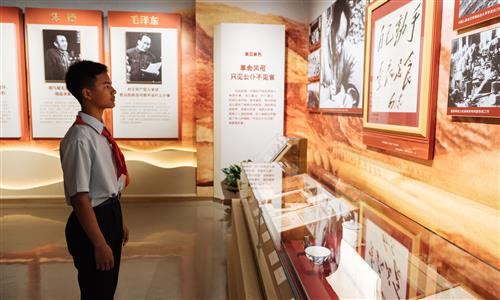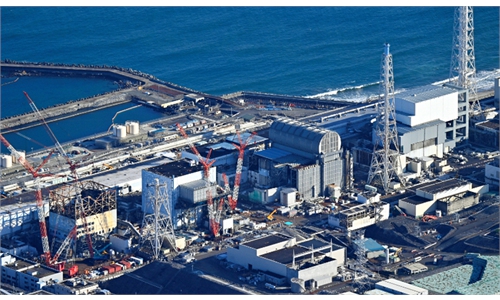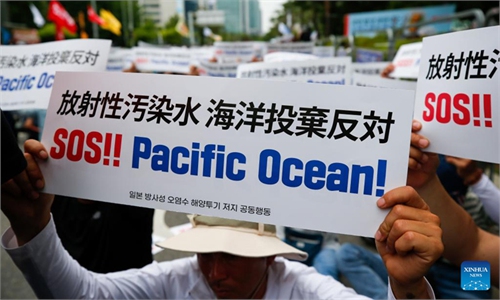Japan urged to learn lessons from history as China commemorates 86th anniversary of July 7 Incident
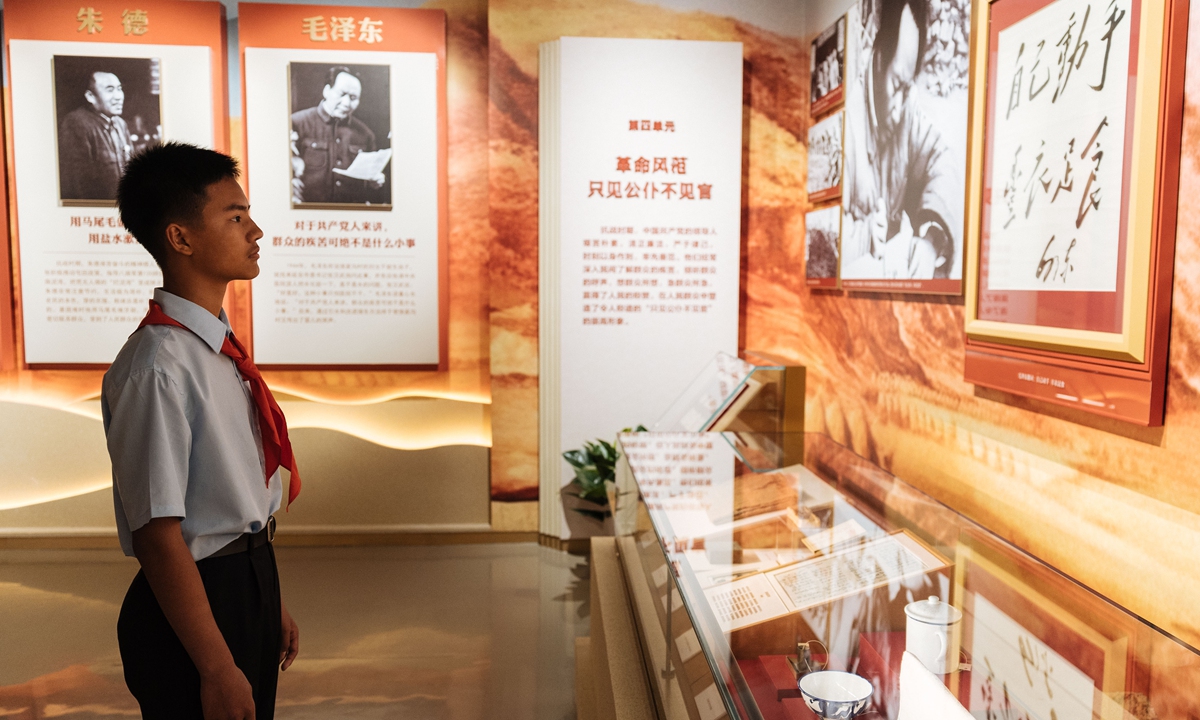
A student looks at photos on display at the Museum of the War of the Chinese People's Resistance Against Japanese Aggression in Beijing, on July 7, 2023. A special exhibition is being held at the museum to commemorate the 86th anniversary of the July 7 Incident, which marked the beginning of Japan's full-scale invasion of China, and China's whole-nation resistance against the Japanese invaders. Photos: Li Hao/GT
From laying flowers at memorial halls to posting images of candles on social media, Chinese people paid tribute to late national heroes on Friday, the 86th anniversary of the July 7 Incident in 1937 that marked the start of Japan's full-scale invasion of China, and China's whole-nation resistance against the Japanese invaders.
Japanese invaders bombarded Wanping [today's Beijing] in 1937 to realize its criminal ambition of annexing all of China by force, and instigated the Lugou Bridge Incident. The Chinese people rose up to resist, and became the main force in the world's anti-fascist war in Asia.
Analysts said that it is always meaningful to look back at that period of history with annual events, especially at a time when Japanese politicians have failed to learn its lessons, as Tokyo's rightward political shift, military rearmament and engagement in NATO's expansion into Asia have become increasingly alarming for all countries in the Asia-Pacific region.
On Friday, a ceremony was held to mark the anniversary. Yin Li, a member of the Political Bureau of the Communist Party of China (CPC) Central Committee and secretary of the CPC Beijing Municipal Committee, presided over the ceremony at the Museum of the War of the Chinese People's Resistance Against Japanese Aggression near Lugou Bridge.
The museum is located next to Lugou Bridge in Beijing, and more than 2,800 relics and 1,100 historical photographs were on display.
The ceremony was attended by about 500 people, including war veterans and family members of military leaders in the war. Attendees offered floral tributes and bowed to pay their respects to those who laid down their lives fighting the Japanese aggression more than eight decades ago.
The museum also launched a special exhibition on the Chinese people's Resistance against Japanese Aggression under the leadership of the Communist Party of China, including more than 240 photos and 250 cultural relics. They also offered free flowers to the visitors to commemorate the martyrs and extended the opening hours.
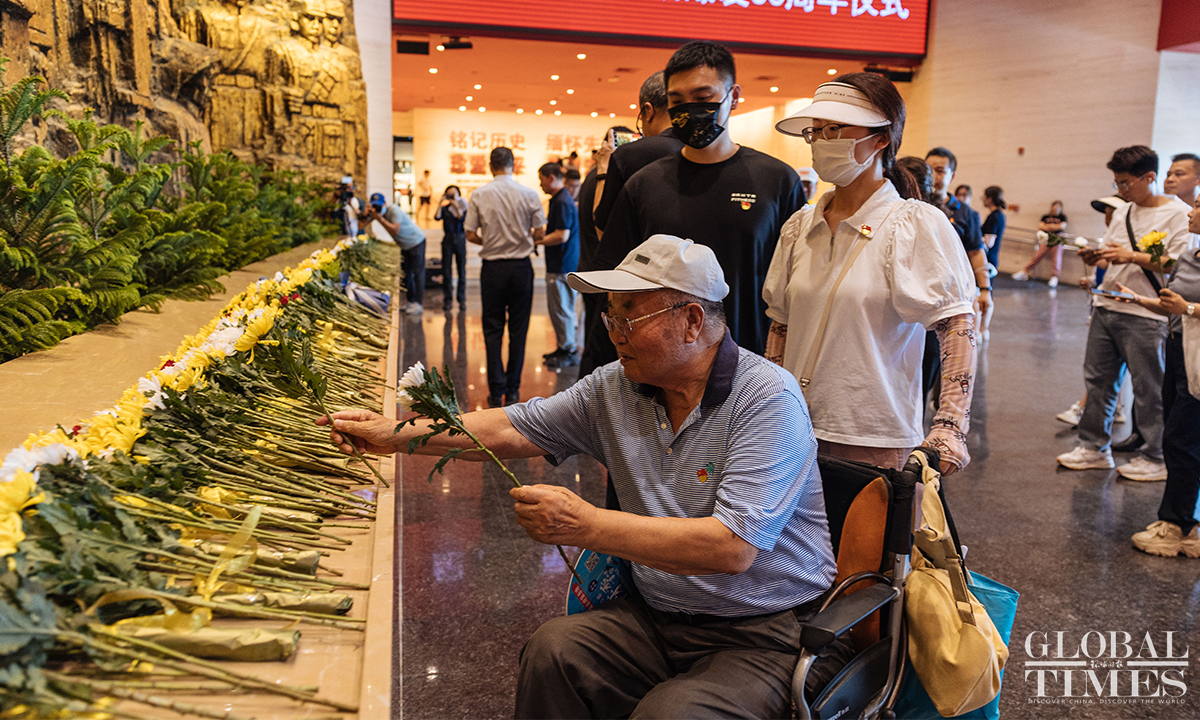
Photo:Li Hao/GT
Together with the above museum in Beijing, more than 40 memorial venues and museums across China have held joint commemorative activities, including themed exhibitions, war-time poetry recitals and opera performances, Global Times learned.
At the Shanghai Songhu Memorial Hall for the War of Resistance against Japanese Aggression, representatives from all walks of life presented flower baskets to the martyrs in front of the Monument to the Unknown Heroes. In cities in East China's Jiangsu Province, students visited local memorial halls to pay tribute to national heroes.
During the war, Chinese military and civilian casualties came to more than 35.8 million, and more than 930 cities were destroyed by the Japanese invaders.
"July 7, 1937" has become a top trend on Twitter-like Weibo, with about 210 million reading and over 510,000 comments as of Friday afternoon.
Netizens have expressed their patriotic fervor, saying that they will become more self-reliant and cherish the hard-won peace. There were also netizens who stressed the risk of the revival of militarism due to growing right-wing instigation in Japan, saying that the country needs to seriously reflect on history.
Japan amended its national security strategy documents in December 2022 and called China its "biggest strategic challenge," paving the way to lifting its defense capability and breaking the constraints of its pacifist Constitution.
Japanese Prime Minister Fumio Kishida is set to attend the NATO summit in Lithuania next week, looking to forge closer ties with the military bloc and increase NATO's Asia-Pacific engagement.
Japan, which joined NATO's unprecedented air force drill in June and is mulling setting up a NATO office in Tokyo, is about to announce new cooperation with the bloc, including consultations on rules for autonomous weapons systems, Japanese media reported.
Japan's military rearmament and gradual engagement in NATO's Asia outreach should ring alarm bells for countries in the region, and will be opposed by countries that historically suffered from Japanese aggression and peace-loving countries, Da Zhigang, director of the Institute of Northeast Asian Studies at Heilongjiang Provincial Academy of Social Sciences, told the Global Times on Friday.
Japan should not continue to smear its neighbors and use the external environment as an excuse to allow right-wing trends to develop, but should bear in mind the lessons of history and not become a new "source of war," which would once again bring harm to the whole region, Da said.
Okinawan Governor Denny Tamaki, who recently visited China, said "Okinawa must never again become a battlefield", in an interview with Global Times. Even so, experts say it is worrying that Japan is still dominated by bellicose right-wing politicians, while rational, introspective and pro-peace voices are gradually fading.
The overall social trend in Japan shows a conservative form of thinking, while the correct cognition of history is becoming increasingly blurred with the passage of time and the voices of civil anti-war groups are gradually declining, Da said.
The lack of a counterweight in Japanese society and the dominance of right-wing politicians are indeed dangerous, he noted.

